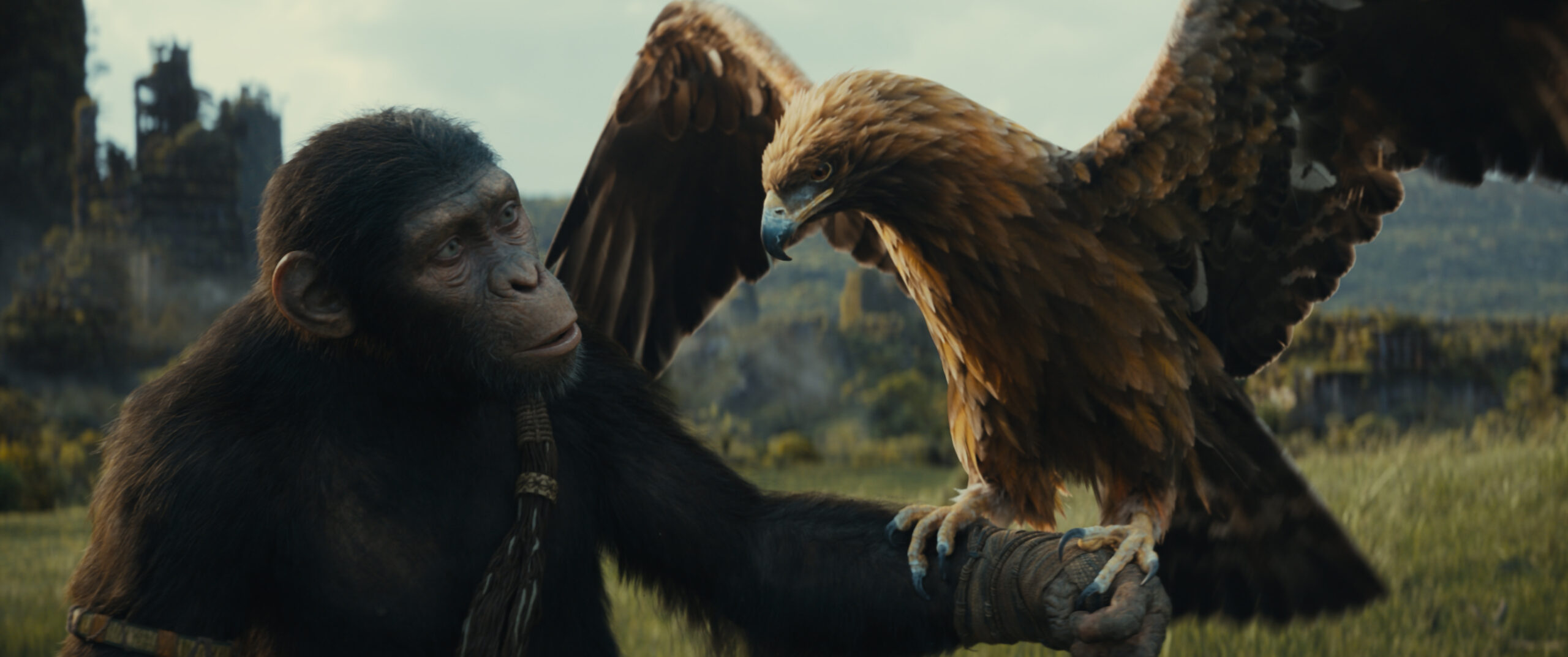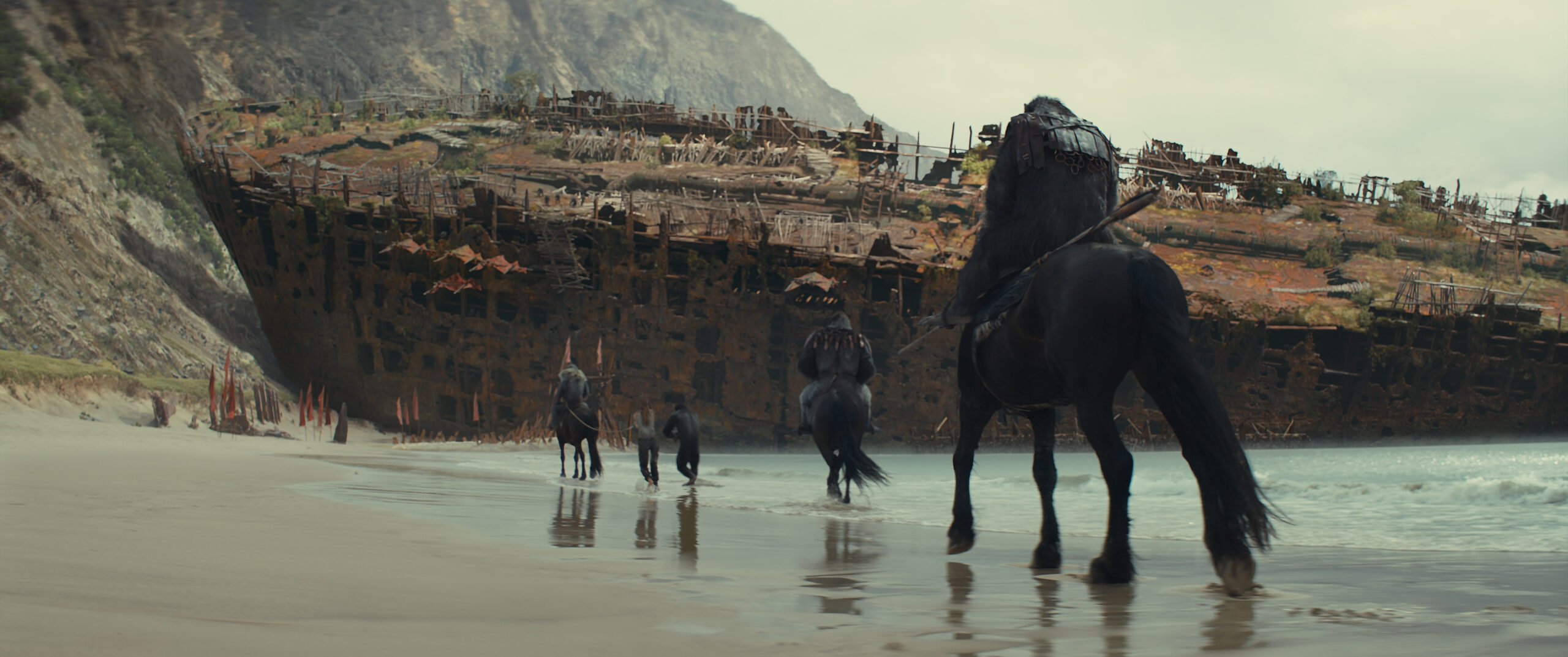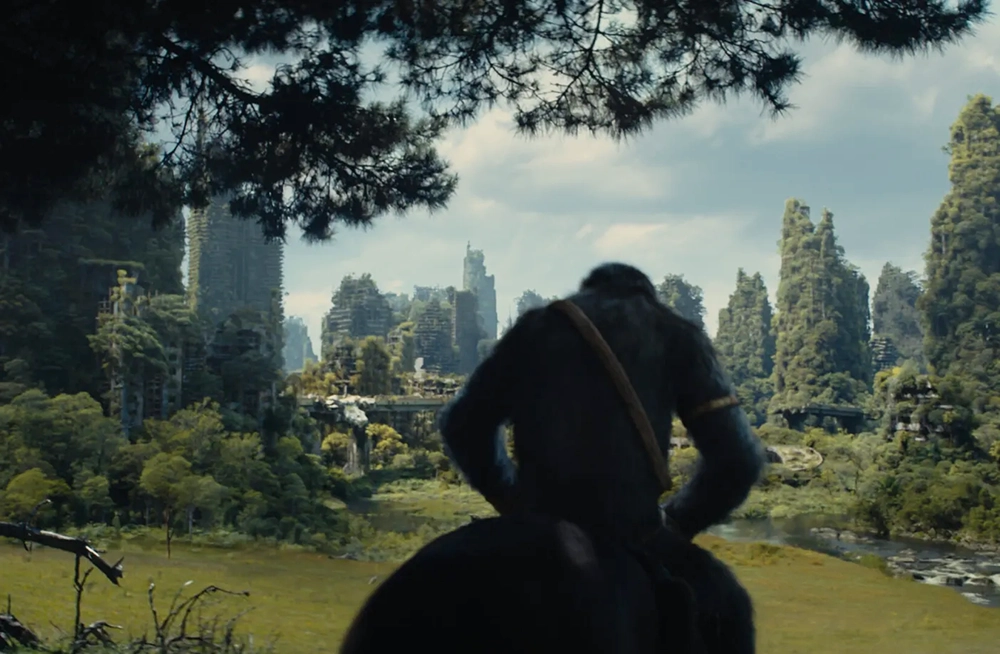The Modern ‘Planet of the Apes’ Films
The trilogy they concocted was all commercial and critical successes. It made audiences crave more stories about this world where great apes are the dominant, intelligent beings. The animals behave like humans, barbarity and all, while the humans act like the animals they were hunting down. A complex sociological theme surrounds each film, which helps each scenario have more depth. The decisions behind the apes’ actions are like a government. This forces humans to form shrewdness, fighting for their lives. In addition to that slight political element, religion is attached, as the newer films centered around Caesar, the king of the ape colony and a preacher for fostering peace with humans.
His legacy is cemented after he died in “War for Planet of the Apes,” where his followers honor him as a God-like figure—the great ape who moved the masses. But the latest (and 10th overall) installment of the franchise, “Kingdom of the Planet of the Apes,” begs the question: What would happen to Caesar’s teachings afterward? Where will the apes alight with humanity? Will they be able to live together through the thick and thin, or will angst fuel their decision-making? These questions are intriguing enough to center a feature around them, as the possibilities are endless and will contain multiple layers. Unfortunately, director Wes Ball (“The Maze Runner”) doesn’t lead this engrossing premise to a formidable height, even though the technical aspects remain top-notch.
A New World Begins Upon Caesar’s Death
“Kingdom of the Planet of the Apes” begins with Caesar’s funeral. As his soul leaves his body, everybody honors his work and words. His loss saddens them. Yet, who will lead the group now? How will the new leader’s perspective differ from Caesar’s? Before we are given answers to these questions, the film cuts to many generations later. More than three hundred years separate this film from the ending of “War for Planet of the Apes.” Caesar’s legacy is still in the hearts of every ape. But, as one might have anticipated, his teachings didn’t remain intact. Many tribes in this new world have manipulated his sayings for their convenience—thirsty for power and control over others.

The first apes we meet in this world are from the eagle clan. These apes raise eagles from the eggs they steal from their nests. During this “robbery,” we meet our protagonist, Noa (Owen Teague), as well as his close friends, Soona (Lydia Peckham) and Anaya (Travis Jeffery). After their almost unsuccessful venture, Noa gets the scene of a non-ape being who nearly ran away with his blanket. The scent is sensed by his father, Koro (Neil Sandilands), the leader of the eagle clan. The two discuss humanity’s small role in this new world. Noa has grown up with a disdain toward humans. But his father assures him that they aren’t creatures worth being afraid of. That instead, he should focus on the upcoming ceremony that serves as a right of passage into adulthood.
We never get to see this special ceremony because another tribe led by Proximus Caesar (Kevin Durand) raids their village and burns it to the ground “in the name of Caesar.” Noa is the only survivor in the scene, left lying in the ashes of his comrades. He lived by the words that “ape must not kill ape.” But Noa’s blood is boiling, and he seeks revenge for Proximus’s actions. The classic hero’s journey begins, with the wise teacher, Raka (Peter Macron), and the unexpected companion he slowly learns to trust, Mae (Freya Allen), adding to the list of tropes regularly seen in these types of stories. Raka, the most interesting character of the bunch, teaches Noa about the true words of Caesar. He states that apes and humans must work together to live in unison and without warfare.
The Lack of Psychological Depth in the Film’s Themes
The addition of Mae to the team helps Noa feel compassion for a species he wants to keep away. “Kingdom of the Planet of the Apes” has a setup with some thought-provoking notions on paper. False preachings, the reversed roles between humans and animals, and how apes are also struggling to hold onto their principles just like humans did before are some of the ideas and concepts that Director Wes Ball plays with. However, he finds himself fighting to provide an in-depth exploration of the psychology and sociological complexities in this world that has changed drastically from the last time we visited it in 2017. Ball uses much of the film’s run-time to travel the plains with these new characters. This helps the viewer feel more immersed and see how society has changed since apes are now the dominant force.
In terms of character development, it is mainly based on the classic hero’s journey traits that we have seen in many sci-fi projects, like “Star Wars”, for example—following the formula beat for beat. You can make this type of story enthralling with the proper narrative structure. Where Ball fails is the cognitive aspects of the protagonist and antagonist. There is talk about Noa and Proximus’ different views on the world and Caesar’s teachings. Yet, it remains short-sighted for the most part. It leaves the viewer craving more psychological warfare, a critical conceptualization worth dissecting.

“Kingdom of the Planet of the Apes” doesn’t have to deliver an in-depth analysis of all of the themes the franchise has covered throughout its six-decade span. That would require an even longer film (and this one already has a languid pacing). But at least you would expect it to approach the material in a way that doesn’t hide from the darkness within—considering how the previous picture was approached and concluded. There is a hint of this during the movie’s last act. Proximus Caesar takes center stage and talks about slowly building an imperial rule where man and ape are subjected to his reign. The film’s thesis is right there. Wes Ball takes too long to get to that crucial point.
The Impressive Visual Effects and Motion Capture Technology
What came before is just filler material to get the viewer up to speed with the lands. It suffers from the same problems as “Avatar: The Way of Water.” A whole section of the film is an introduction. Meanwhile, the last hour comes with the real issue at hand. But James Cameron does so while developing his characters to the point where you care for them once the final strand arrives. Meanwhile, Noa and Mae aren’t as compelling as the main characters. On the technical side, “Kingdom of the Planet of the Apes” is very impressive. The apes look realistic. Motion capture technology keeps reaching a new height with this series, each time getting more awe-inspiring.
I still miss the tactility of John Chambers’ work in the original films. Yet there is still plenty to admire in the visual effects department. It reaches a point where you get so immersed in this world that you feel every element in the scenery. It has been a while since a big studio production paid so much attention to detail in its visual effects. That is why I can’t stop giving the franchise its flowers for it. But, at the end of the day, it comes as a slog with undeveloped notions about religion, society, and false prophets. “Kingdom of the Planet of the Apes” ends as a lackluster piece about complex sociological theories and more a bland sci-fi adventure with some somewhat noteworthy popcorn set-pieces.

“Kingdom of the Planet of the Apes” hit theaters worldwide on May 10th, 2024.


